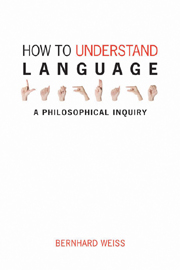Book contents
- Frontmatter
- Contents
- Preface
- 1 The puzzles of language
- 2 The starting-point for analysis
- 3 Analysing sentence-meaning
- 4 Analysing synonymy
- 5 Radical translation
- 6 The structure of a theory of meaning
- 7 Radical interpretation
- 8 Linguistic norms, communication and radical interpretation
- 9 Linguistic normativity
- 10 Radical or robust?
- 11 Language and community
- 12 Rules and privacy: the problem
- 13 Rules and privacy: the solution?
- 14 Truth-conditions versus use-conditions
- Notes
- Bibliography
- Index
2 - The starting-point for analysis
- Frontmatter
- Contents
- Preface
- 1 The puzzles of language
- 2 The starting-point for analysis
- 3 Analysing sentence-meaning
- 4 Analysing synonymy
- 5 Radical translation
- 6 The structure of a theory of meaning
- 7 Radical interpretation
- 8 Linguistic norms, communication and radical interpretation
- 9 Linguistic normativity
- 10 Radical or robust?
- 11 Language and community
- 12 Rules and privacy: the problem
- 13 Rules and privacy: the solution?
- 14 Truth-conditions versus use-conditions
- Notes
- Bibliography
- Index
Summary
Although it has a wider range of techniques available to it, analytical philosophy is closely linked with a bold, direct approach towards understanding a philosophically problematic concept: conceptual analysis. Conceptual analysis aims at revealing the nature of a complex concept by revealing how it is constituted. It proceeds by focusing on central applications of the concept and detailing necessary and sufficient conditions for the application of the concept in those circumstances. The central applications are those, if they exist, from which all other applications flow, that is, can be explained. Let us consider an example of attempted conceptual analysis, in order to bring out some general points about how the method works. We shall consider the justified, true-belief account of knowledge.
Knowledge
The analysis of knowledge focuses on what confers truth on sentences of the form:
S knows that p.
In other words, it attempts to fill in the question mark in the following:
S knows that p iff?
One, sometime popular suggestion, is the following:
S knows that p iff S believes p, S's belief in p is justified and p is true.
We shall leave it to epistemologists to decree on the adequacy of this definition: that is not our present concern. Simply note the process. We begin with ordinary sentences of English that uncontroversially involve use of the concept.
Information
- Type
- Chapter
- Information
- How to Understand LanguageA Philosophical Inquiry, pp. 13 - 32Publisher: Acumen PublishingPrint publication year: 2009
